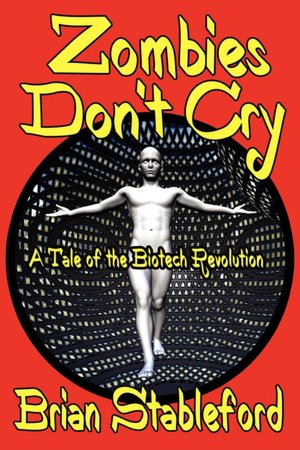Review by Barbara Godwin
They don't cry because in this future world, the resurrection process
has deprived them of their tears, but they have emotions, loves and
needs as much as the living. Death might have changed them, but the
zombies in Brian Stableford's black comedy, contrary to the usual
depiction, are the harmless and the innocent, and they have been brought
back to "afterliving" in a degenerate England, which is far from
being "a green and pleasant land."
The time is the aftermath of the 2nd Great Depression and
politicians, desperate to keep popularity, bow to people's angst at the
loss of loved ones. As a result medical science techniques to reclaim
people from death have been legalised. What both politicians and medics
have failed to do is to redefine death and to prepare society for the
problems of living with the resurrected. Therefore the reclaimed remain
legally dead even while they walk among the living. A subspecies has
been created, and the British people are dependent upon a Sunday evening
soap opera, "Resurrection Ward" for information.
Many zombies were previously gainfully employed before death, often
respectable and contributing citizens, but they have lost their
"property, social status, and human rights." There is no justice for
the dead because it is not illegal to discriminate against them.
Brian Stableford's brilliant satire exploits the littleness of
societal norms, for this England retains the prejudices of contemporary
society with its structures and in-groups and inability to accept
differences from whatever cause. Differentiated from the living by their
pallor, the resurrected are albinos, and this marks them out as targets
for the extremists: the ignorant, those hidebound by religious beliefs
who see them as the progeny of Satan, and by a group known as England's
Defenders who will whip up and spearhead any attack on any minority that
the populace fear.
Even the loved ones of the reclaimed have problems relating to them,
for how do you treat someone who is dead, yet is standing in front of
you with most of the attributes of the living person brother, friend or
son? Even the least bigoted of the book's characters do not do well in
this test.
Yet, zombies have one major advantage "—they can remain in their
present form forever, for they do not grow older, and theoretically they
can't "die" again, at least from natural causes. Accidents are not
ruled out.
The story follows the experiences of Nicholas Rosewell who awakes in
a hospital bed to find that he died in a bomb explosion at the Oracle in
Reading. He was the only one of five deceased who could be reclaimed
from death. He is damned immediately as evil by other patients in the
same ward.
At home he finds new problems. His family treat him differentially,
as if he is ill. His accounts have been closed, because of course, he is
dead. Death has meant that he has lost his job, and, although he can
reapply, he knows he will be put in that perpetual file for those who
will be informed when there is a vacancy. The undead have become the new
unclean.
Even worse, the love of his life, his girlfriend, is no longer
interested, although his feelings are unchanged.
He joins other zombies who have formed a social group at the
Salvation Army building. The dead have Internet access to keep up a
semi-anonymous contact with the world outside and perform exercises to
keep their zombie bodies healthy. Non-aggression is their by-word, as
they are trying to find their footing in the society that recreated and
cold-shouldered them; yet they are deeply aware that the populace's fear
of the near alien group that has appeared in their midst.
Events come to a head, when the mob elements, misinterpreting deaths
on the road to be orchestrated by zombies in order to increase their
numbers, attack the Salvation Army hall in a dramatic reversal of
The Night of the Living Dead.
Zombieism is in its infancy and no-one knows about the births,
illnesses and attributes the future of the dead may bring. It is clear
that because of their long semblance-of-life span, the zombies, meek and
mild as they are, must, logically, inherit the earth. The narrator
comments, "Let's hope we really can live forever. That way we'll live to
see the day the dead outnumber the living and the duration of our
afterlives have so far outstripped the time before our deaths that we'll
have forgotten we were ever alive."
The author never loses an opportunity for the jokes that point up the
ridiculousness of both this futuristic society and its prejudices: the
"Afterlife"; rebirthdays; that zombies are "whiter than white," and
their pallor a cruel joke to differentiate them; the Royal Berks
"Burkers" who are the Resurrection Men; the nurse who committed
suicide, who has to explain herself to her family; the murderer in
hospital, and the Bleak House style court case to allow him to
receive the benefit of "Resurrection Techniques."
Yet this world casts a chill. If this is the way medical science is
leading us, here is one reviewer has also failed the test. I don't
believe that I, personally, could ever live among the dead, and please,
when I die, allow me to stay that way.
|


